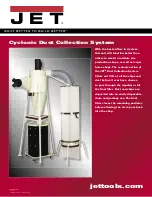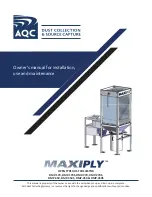
11) Use extra care when collecting dust on stairs.
12) To avoid injury from accidental starting, unplug power cord before
changing or cleaning the filter/dust bag or the chip bag.
13) Do not use without the filter/dust bag and/or the chip bag in place.
14) Do not unplug by pulling on the cord. To unplug, grasp the plug,
not the cord.
15) Turn off controls before turning off.
16) Do not use with damaged cord, plug or other parts. If your dust
collector is not working as it should, has missing parts, has been
dropped, damaged, left outdoors, or dropped into water, send for
servicing.
17) Do not pull or carry by the cord, use cord as handle, close a door
on cord, or pull cord around sharp edges or corners. Do not run
your dust collector over the cord. Keep cord away from heated
surfaces.
18) Do not handle the electrical plug with wet hands.
19) Do not put any objets into the ventilation openings. Do not vacuum
with any ventilation opening blocked, keep free of dust, lint, hair or
anything that may reduce the air flow.
20) Keep hair, loose clothing, fingers and all other parts of the body
away from openings and moving parts.
21) Extension cords in poor condition or that are too small can pose
fire and shock hazards. When using an extension cord, make sure
it is in good condition.
22) Connect to properly grounded outlet only.
CAUTION:
If using this dust collector to keep airborne wood dust in
heavy usage within acceptable limits, you must regularly monitor
airborne dust and maintain the dust collector to avoid exceeding dust
limits. Each application is unique. Your maintenance schedule must
therefore be tailored to your specific use.
Safety is a combination of common sense, staying alert and knowing
how your dust collector works.
WARNING: TO AVOID MISTAKES THAT COULD RESULT IN
SERIOUS, PERMANENT INJURY, DO NOT CONNECT THE
POWER CORD UNTIL THE FOLLOWING STEPS HAVE BEEN
COMPLETED:
1) Assembly, mounting and alignment.
2) Learn the function and proper use of the ‘’ON/OFF’’ switch.
3) Read and understand all instructions and operating procedures
throughout the manual.
BEFORE EACH USE:
1) Inspect your dust collector. If any parts are missing, bent, or fail in
any way, or any electrical components do not work properly, turn off
the dust collector, remove the switch key and remove the power
cord from the power supply. Replace damaged, missing or failed
parts before using the dust collector again.
2) Plan your work to protect your eyes, hands, face, ears and body.
3)
WEAR SAFETY GOGGLES. ‘’FORESIGHT IS BETTER THAN
NO SIGHT’’
. Wear safety goggles, not glasses, that comply with
ANSI Z87.1. Operating any power tool can result in foreign objects
being thrown into the eyes which can result in permanent eye
damage.
4) When cleaning the dust collector bags, wear a dust mask.
This dust collector is specifically designed to capture sawdust and
wood chips at the source. The fine dust is filtered by the upper dust
bag while the heavier particles settle in the lower dust bag for easy
removal.
DO NOT USE AS A VACUUM
.
CAUTION:
The blower housing contains a high speed fan blade that
can amputate fingers, grab loose clothing and neckties, or propel
dust at high velocities.
DO NOT OPERATE WITHOUT ALL PARTS
IN PLACE
.
Do not attempt to clean, remove dust bags or service while in opera-
tion. Disconnect from power source.
IMPORTANT NOTE:
Static shocks are common in dry areas or when
the relative humidity of the air is low. To reduce the frequency of
static shocks in your home, the best remedy is to add moisture to the
air with a console or installed humidifier.
SPECIFIC SAFETY INSTRUCTIONS
FOR YOUR DUST COLLECTOR
MOTOR
HORSEPOWER ..............................................................................................................................................................................2 HP
VOLTAGE ........................................................................................................................................................................................240V
AMPERAGE ........................................................................................................................................................................................9A
R.P.M ..............................................................................................................................................................................................3450
Hz ........................................................................................................................................................................................................60
PHASE ..................................................................................................................................................................................................1
AIR SUCTION CAPACITY ..................................................................................................................................................1200 C.F.M.
HOSE DIAMETER ..............................................................................................................................................................................5’’
INLET HOSE DIAMETER ....................................................................................................................................................................4’’
BAG QUANTITY & SIZE............................................................................................................................................2 @ 20’’ X 34-1/2’’
SPECIFICATIONS














